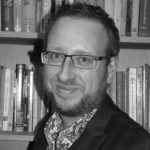Interfaith dialogue is often portrayed as a way of bridging cultural gaps and allowing a “safe space” for mutual respect between different religious worldviews and communities. Whilst it is certainly true that this can occur, in this presentation I will be proposing that interfaith dialogue is, in its framework and performance, a complex projection of inclusion, exclusion and reinforcing of pre-existent relational religious identities. By focusing upon the historic case study of the first ever World’s Parliament of Religions in Chicago in 1893, and bringing in recent and contemporary examples of interfaith encounter (including religion and non-religion) from the UK, I will discuss the particular importance of language and power discourse in the projection of religious identities which seek to both embrace and highlight difference.
Biography

Stephen received his BA and PhD from the University of Wales, where he was subsequently appointed Lecturer in Religious Studies. He was then appointed as Fellow in the Study of Religion at Liverpool Hope University and is now Senior Lecturer at Wolverhampton, the multicultural heart of the UK. He has delivered invited papers at universities in India, Turkey, Australia, the USA, and across the UK and Europe. In 2013 Stephen was the lead coordinator for the European Association for the Study of Religions and the International Association for the History of Religions Conference in Liverpool, UK.
